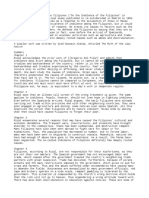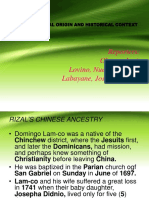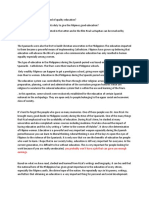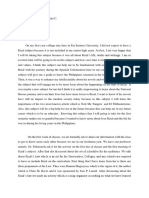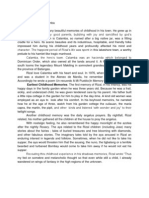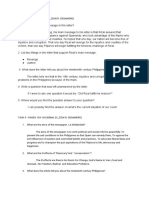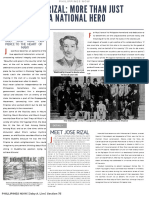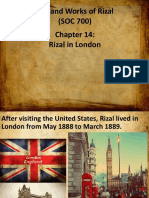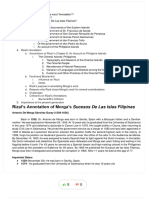Critical Essay For Jose Rizal As Propagandist
Critical Essay For Jose Rizal As Propagandist
Uploaded by
ItzLian SanchezCopyright:
Available Formats
Critical Essay For Jose Rizal As Propagandist
Critical Essay For Jose Rizal As Propagandist
Uploaded by
ItzLian SanchezOriginal Title
Copyright
Available Formats
Share this document
Did you find this document useful?
Is this content inappropriate?
Copyright:
Available Formats
Critical Essay For Jose Rizal As Propagandist
Critical Essay For Jose Rizal As Propagandist
Uploaded by
ItzLian SanchezCopyright:
Available Formats
Name: Jessie Isa Leal D.
Sanchez Class Schedule: M-W-F 3:00-5:00 Course
& Year: BSBA FM 2 Name of Instructor: Diana Mae Atacador Subject: RZL10BA
Date of Submission: January 17, 2022
Critical Essay for Jose Rizal as Propagandist
Rizal is a huge part of Philippine history, and his works are still given life today by appreciating
and learning about his life and works. His triumphs and struggles should inspire us to do our best
and be proud of ourselves when it comes to defending our own country, because he sacrificed his
life through his work for Filipinos to be meaningful and free.
During Rizal's long career, he embraced and thought the best of what Filipinos could be, so he
did everything he could to free his fellow Filipinos from struggles and misery. To free his fellow
Filipinos from the bonds of political tyranny and its corollaries, misery and ignorance, became
his all-consuming raison d'être, pervading all aspects of his life, eventually excluding all other
considerations-family, friends, personal happiness, and life itself. Rizal rose to prominence as a
leader of the reformist movement known as Propaganda, which waged an unwavering campaign
for political and social liberties, lobbying the peninsular government through their connections
with liberal Spanish politicians. Rizal annotated the book Sucesos de las Islas Filipinas, written
by the Spaniard Antonio Morga, to prove his point and refute the accusations of prejudiced
Spanish writers against his race. The book provided an unbiased depiction of 16th century
Filipino life culture. Rizal's annotation demonstrated that Filipinos had developed culture prior to
the arrival of the Spaniards. Rizal even wrote incessantly for La Solidaridad, a propaganda
mouthpiece, hoping, like his fellow propagandists, that the Filipinos' cries would be heard by the
powers that be. His greatest impact on the development of a Filipino national consciousness,
however, was the publication of two novels: El Filibusterismo in 1891 and Noli Me Tangere in
1886, both of which he hoped would be successful in achieving his goals after all other means
had failed, which led to his death. He researched Philippine history to demonstrate that we
Filipinos had our own culture prior to colonization and that we are not inferior to the white man.
It was for this reason that he tackled Morga's Sucesos de las Islas Filipinas and merged the
registers for Philippine history books at the London Library. Pride in the Filipino's worth
motivated him to debunk the myth of the so-called "indolence of the Filipino" and to label those
Filipinos who denied their native tongue as rotten fish; to study Tagalog seriously and attempt to
produce a comprehensive Tagalog dictionary. With the same conviction, he took on the generic
term indio, despite its negative connotations, and transformed it into one of dignity and nobility.
Jose Rizal as Propagandist pg. 1
Name: Jessie Isa Leal D. Sanchez Class Schedule: M-W-F 3:00-5:00 Course
& Year: BSBA FM 2 Name of Instructor: Diana Mae Atacador Subject: RZL10BA
Date of Submission: January 17, 2022
During his exile in Dapitan, he studied local flora and fauna, collected various specimens, and
shared observations with colleagues. In order to remind us Filipinos to defend our own nation
and to move forward and do the best, he used his lottery winnings to create local water and
lighting systems, he founded a school with the local boys, treated patients free of charge, and
encouraged local people to plant fruit trees, sugar cane, cocoa, and start their own marketing
company and be inspired to give our blood, sweat, and tears for our country's freedom.
Jose Rizal as Propagandist pg. 2
You might also like
- Jose Rizal's Collaborations with Other HeroesFrom EverandJose Rizal's Collaborations with Other HeroesRating: 4 out of 5 stars4/5 (6)
- Marie Report World LitDocument4 pagesMarie Report World LitJonalyn Manangan100% (2)
- The Rizal Bill of 1956 Horacio de La Costa and The BishopsDocument26 pagesThe Rizal Bill of 1956 Horacio de La Costa and The BishopsRory McG100% (4)
- Reaction Paper RizalDocument1 pageReaction Paper RizalKim Sanchez50% (4)
- Rizal's Life: Exile, Trial and Death: Prepared By:maureen D. AguisandoDocument13 pagesRizal's Life: Exile, Trial and Death: Prepared By:maureen D. AguisandoCassandra Karolina50% (2)
- Rizal - A Documentary FilmDocument1 pageRizal - A Documentary FilmJannaRica Beason0% (1)
- La Juventud InterpretationDocument2 pagesLa Juventud InterpretationYuki-Pauline NagatoNo ratings yet
- The Rizal in Me Parallelism Between Me and RizalDocument2 pagesThe Rizal in Me Parallelism Between Me and RizalAltessa Lyn ContigaNo ratings yet
- Journal About Rizal and Your Life As A StudentDocument2 pagesJournal About Rizal and Your Life As A Studentjulianna lois alimorongNo ratings yet
- Reflection 1Document2 pagesReflection 1Hanna Sobreviñas Amante100% (1)
- Rizal Life and Works: Critical Analysis of The Rizal LawDocument7 pagesRizal Life and Works: Critical Analysis of The Rizal LawKang ChulNo ratings yet
- On The Indolence of The FilipinosDocument2 pagesOn The Indolence of The FilipinosKian MarananNo ratings yet
- Tracing Rizal's Travel Blank MapDocument3 pagesTracing Rizal's Travel Blank MapReyn Zamudio III100% (1)
- If You Were The Defense Council...Document2 pagesIf You Were The Defense Council...Graca MachelNo ratings yet
- Early Customs and TraditionsDocument92 pagesEarly Customs and TraditionsHervey Tripoli BuquelNo ratings yet
- RizalDocument23 pagesRizaljanit oberezNo ratings yet
- Rizal Lesson 5Document3 pagesRizal Lesson 5Crizele Joy LagudaNo ratings yet
- Analysis of Ra 1425Document2 pagesAnalysis of Ra 1425Rica Mae NaquilaNo ratings yet
- Activity On The Pursuit of NationhoodDocument2 pagesActivity On The Pursuit of NationhoodVixen Aaron EnriquezNo ratings yet
- Chapter 4 RIZAL PDFDocument2 pagesChapter 4 RIZAL PDFRose Vera Mae Encina100% (1)
- Anecdotes On Rizal, The AteneanDocument4 pagesAnecdotes On Rizal, The AteneanTom Dela Cruz0% (3)
- Anti FriarDocument1 pageAnti FriarJamela OrielNo ratings yet
- Chapter 3 - Remembering RizalDocument12 pagesChapter 3 - Remembering RizalBenj Chums100% (1)
- Amor Patrio FinalDocument4 pagesAmor Patrio FinalKATHERINE GALDONESNo ratings yet
- RizalDocument14 pagesRizalRai Paul CanonizadoNo ratings yet
- A Movie Analysis of Jose Rizal Movie (1998)Document7 pagesA Movie Analysis of Jose Rizal Movie (1998)Kate TomaganNo ratings yet
- Unit Ii. The Philippines in The 19 Century As Rizal'S ContextDocument12 pagesUnit Ii. The Philippines in The 19 Century As Rizal'S ContextEraldine “aldine” JikushiNo ratings yet
- Chapter 10 Rizal Lesson Learned and ObservationDocument2 pagesChapter 10 Rizal Lesson Learned and ObservationMuamar Kian Ulangkaya100% (1)
- I Am Sharing The Life and Works of Rizal With YouDocument57 pagesI Am Sharing The Life and Works of Rizal With YouAngelo RoqueNo ratings yet
- Rizal's Ancestors Have Been Famous Since The Beginning of His Life. It Is Very Common For Them To AttendDocument4 pagesRizal's Ancestors Have Been Famous Since The Beginning of His Life. It Is Very Common For Them To Attendfarhanah ImamNo ratings yet
- Why Were The Filipinos Deprived of Quality EducationDocument4 pagesWhy Were The Filipinos Deprived of Quality EducationAngelNo ratings yet
- Noli Me TangereDocument2 pagesNoli Me TangereCheery joy Mante EscrinNo ratings yet
- Rizal NarrativeDocument3 pagesRizal NarrativeTherese Michaela RullanNo ratings yet
- Rizal Law (RA 1425) Philippine National HeroDocument1 pageRizal Law (RA 1425) Philippine National HeroKriselle Ann CalsoNo ratings yet
- Veneration Without Understanding: Does Rizal Deserve To Be Our National Hero?)Document21 pagesVeneration Without Understanding: Does Rizal Deserve To Be Our National Hero?)elleNo ratings yet
- Rizal CVDocument8 pagesRizal CVKlaudyn Macapagal SisonNo ratings yet
- Short QuizDocument16 pagesShort QuizMarry Jane Rivera Sioson0% (1)
- Chapter 11Document71 pagesChapter 11JL A H-Dimaculangan100% (2)
- Chapter 5 Rizal ReportingDocument39 pagesChapter 5 Rizal ReportingShiroa Noko0% (1)
- Reflection On Veneration With UnderstandingDocument1 pageReflection On Veneration With UnderstandingJustin ParasNo ratings yet
- Future Plans by Wole SoyinkaDocument22 pagesFuture Plans by Wole SoyinkaJessica De Quintos100% (1)
- The Characters of Noli Me Tangere Ppt. 1Document25 pagesThe Characters of Noli Me Tangere Ppt. 1Marvin ManaloNo ratings yet
- Home After 5 YearsDocument2 pagesHome After 5 YearsChat-Chat Hernandez Reales100% (2)
- Jose Rizal Reaction PaperDocument13 pagesJose Rizal Reaction PaperMikee PNo ratings yet
- Rizal 2Document2 pagesRizal 2Jazon ValeraNo ratings yet
- First Poem by RizalDocument5 pagesFirst Poem by Rizalanon_448814852100% (1)
- M4 Post-Task - Why Was The Rizal Hero A Creole?Document1 pageM4 Post-Task - Why Was The Rizal Hero A Creole?Cher NaNo ratings yet
- Noli Me Tangere and El Filibusterismo by Jose RizalDocument14 pagesNoli Me Tangere and El Filibusterismo by Jose RizalJane Cresthyl LesacaNo ratings yet
- Ang Dapat Mabatid NG Mga Tagalog Ni Andres Bonifacio - Article ReviewDocument10 pagesAng Dapat Mabatid NG Mga Tagalog Ni Andres Bonifacio - Article ReviewJacob100% (1)
- Indolence of The Filipino PeopleDocument5 pagesIndolence of The Filipino PeopleIae Montero100% (1)
- Chapter 3 - School Life at Ateneo and The University of StoDocument6 pagesChapter 3 - School Life at Ateneo and The University of StoNomer Gomez PunoNo ratings yet
- Poem Reflection of RizalDocument2 pagesPoem Reflection of RizalClarizzaNo ratings yet
- Alamag, B.O. - Jose Rizal Curriculum VitaeDocument4 pagesAlamag, B.O. - Jose Rizal Curriculum VitaeResel O. GalloNo ratings yet
- 12 Ileto - Rizal and The Underside of Philippine HistoryDocument37 pages12 Ileto - Rizal and The Underside of Philippine Historyclaire yowsNo ratings yet
- Rizal Universal ExpositionDocument5 pagesRizal Universal ExpositionDanna Jenessa Rubina SuneNo ratings yet
- Task 8 - Page 95 and Task 9 - Pages 103-104 (Bsma 2c - Zion R. Desamero)Document2 pagesTask 8 - Page 95 and Task 9 - Pages 103-104 (Bsma 2c - Zion R. Desamero)Zion EliNo ratings yet
- Madrid. He Continued Writing in Paris (1/4) and Finished It in Germany (1/4) - RizalDocument7 pagesMadrid. He Continued Writing in Paris (1/4) and Finished It in Germany (1/4) - Rizalunknown nooneNo ratings yet
- A Brief Synopsis LRDocument3 pagesA Brief Synopsis LRJEFFREY VILLANGCANo ratings yet
- Geclwr PDFDocument2 pagesGeclwr PDFPatricia Mae RiveraNo ratings yet
- Module 7 - RizalDocument3 pagesModule 7 - RizalMarianna GayatinNo ratings yet
- Philo 1.2Document1 pagePhilo 1.2ItzLian SanchezNo ratings yet
- Rizal's Law TimelineDocument4 pagesRizal's Law TimelineItzLian SanchezNo ratings yet
- Philo 2.1 Relfection Paper (Brave 2012)Document3 pagesPhilo 2.1 Relfection Paper (Brave 2012)ItzLian SanchezNo ratings yet
- 1.1 PhiloDocument2 pages1.1 PhiloItzLian SanchezNo ratings yet
- Rizal101 SyllabusDocument8 pagesRizal101 SyllabusJoshuaNo ratings yet
- KatipunanDocument26 pagesKatipunanStar MercadoNo ratings yet
- RIZAL LecturesDocument21 pagesRIZAL LecturesJanezka Aquino SantosNo ratings yet
- Lesson 1 (Rizal Law and The Advent of A National Hero)Document4 pagesLesson 1 (Rizal Law and The Advent of A National Hero)RraineeRoss UnNo ratings yet
- Learning Modules IN Ge Rizal: Lucille G. TanguihanDocument87 pagesLearning Modules IN Ge Rizal: Lucille G. TanguihanJoey ComandanteNo ratings yet
- RizalDocument24 pagesRizalnyleemiaNo ratings yet
- Jose Rizal: A Hero and An ArtistDocument2 pagesJose Rizal: A Hero and An ArtistPat60% (5)
- Rizal As SymbolDocument18 pagesRizal As SymbolLeila Janezza ParanaqueNo ratings yet
- SucesosDocument31 pagesSucesosGerbland Benzon58% (12)
- Feature Story of Jose RizalDocument1 pageFeature Story of Jose RizalJaby LimNo ratings yet
- Context and Texts Meaning 2Document39 pagesContext and Texts Meaning 2Jamaica OaoNo ratings yet
- Lesson 6 RizalDocument4 pagesLesson 6 RizalChristian EstevezNo ratings yet
- José Rizal Life TimelineDocument2 pagesJosé Rizal Life TimelineRezia Rose Pagdilao100% (2)
- Retraction of RizalDocument9 pagesRetraction of RizalBea Susa PaghubasanNo ratings yet
- General EnglishDocument23 pagesGeneral EnglishkayebundacNo ratings yet
- Chapter 14 RizalDocument45 pagesChapter 14 RizalKristle DimayugaNo ratings yet
- Reading in Philippine HistoryDocument8 pagesReading in Philippine HistoryravenNo ratings yet
- Childhood Years in Calamba 2Document20 pagesChildhood Years in Calamba 2cedrickcusil.crestNo ratings yet
- Philippines Rizal's TimeDocument8 pagesPhilippines Rizal's TimeEJ CooperNo ratings yet
- Andres Bonifacio The TranslatorDocument4 pagesAndres Bonifacio The Translatorsheree gaye orenya100% (1)
- TLWRDocument2 pagesTLWRDanica AsaNo ratings yet
- The Indolence of The Filipino by José RizalDocument9 pagesThe Indolence of The Filipino by José RizalMaria OzaoNo ratings yet
- BORBON Formative Assessment 1Document2 pagesBORBON Formative Assessment 1Camille BorbonNo ratings yet
- Jose RizalDocument26 pagesJose RizalAlyssa Mae CruzNo ratings yet
- Rizal EnviDocument3 pagesRizal EnviKane Errol Manusig100% (1)
- Girlfriends of RizalDocument10 pagesGirlfriends of RizalCEEJAY LUMBAONo ratings yet
- BS Criminology SS5 Movie Analysis For FinalsDocument14 pagesBS Criminology SS5 Movie Analysis For FinalsJenny Peñacoba SalcedoNo ratings yet
- Title: Rizal'S Life: Exile, Trial, and Death VI. Pre-Test: Answer The Following Questions BelowDocument4 pagesTitle: Rizal'S Life: Exile, Trial, and Death VI. Pre-Test: Answer The Following Questions BelowJenemar100% (6)
- 4 Rizals Annotation of Morgas Sucesos de Las Islas Filipinas - CompressDocument13 pages4 Rizals Annotation of Morgas Sucesos de Las Islas Filipinas - CompressKaecee Wong100% (1)











